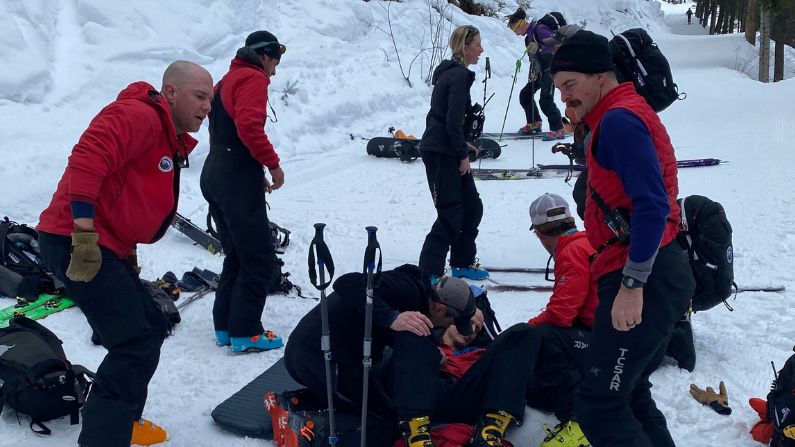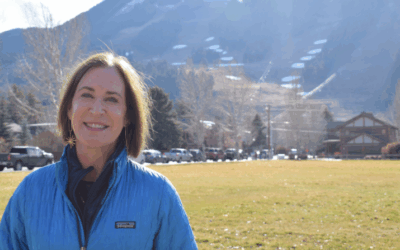The Fine Line tells real stories of adventure, risk and rescue in the backcountry of Jackson Hole. In each podcast, first-responders are joined in the studio by the people they saved to discuss real-life incidents from their respective points of view.
In advance of a brand new episode that aired recently, Communications Director for the Teton County Search and Rescue Foundation and host of The Fine Line, Matt Hansen, joined KHOL for a live in-person interivew.
The following transcript has been edited for clarity and brevity. This conversation was recorded on Thursday, March 17.
JACK CATLIN/KHOL: So The Fine Line has produced more than 40 episodes, ranging in topics from lost backpackers, skiing accidents, whitewater rescues and even bear attacks. Can you peel back the curtain a little bit and let us know what goes into each of these episodes? For instance, how do you choose the topic, and what is the process involved from start to finish after a rescue?
MATT HANSEN: The team of volunteers will do a debrief, and there’s an incident report, and then I can kind of look through all those and talk to different volunteers. And after every single rescue, someone is going to have a story. Some of those make for really good storylines and podcasts. From there, if there’s something that sort of piqued my interest, I’ll start to talk with different SAR volunteers who are on the incident. I talk to Rebecca Huntington, who has been involved with The Fine Line since the beginning, and different people at the foundation. And just kind of exploring whether or not different rescues topics would be viable for an episode from there.
It’s just reaching out to the different people involved and seeing if they want to come on. And sometimes that’s a really quick phone call. Sometimes it’s a text message or an Instagram message. And it’s really quick, and sometimes it just falls together. Other times, it’s a years-long process even because you’re really, you know, someone who’s been through a traumatic event in the backcountry. You’re asking them to go to a very vulnerable place and to relive that experience. And that can be really tough for some people. And not everyone is into it. And that’s fine. Like, I can’t blame anyone for not wanting to go there again.
But for people who do come on and share their stories, I think that they find a certain amount of closure in that experience. And then also, it allows them to meet and speak face to face with the SAR volunteers who came to their aid. And that’s one of the coolest parts for me is to help that meeting happen because those are some of those cool moments that happen behind the scenes that I get to witness and get to see. And that is definitely a special part of it, for sure.
KHOL: Episode #42 featured a story about an accident in the Sliver Couloir in Grand Teton National Park and was all about the importance of communication. What are some of the other important aspects of being safe in the backcountry?
HANSEN: Well, that episode for sure was one that I walked carefully on, and I think that it’s something that has been coming to a head for many years. I did a feature story for Powder Magazine about five or six years ago about Grand Teton National Park. And one of the things that people were talking about was how to navigate different groups and different people in the backcountry because they were just starting to see more people skiing the high alpine in the Tetons. You know, the park just came out yesterday or this morning saying that this past year was the busiest Grand Teton National Park has ever been. And so I think that what that episode did was it highlighted this new reality that all of us need to be aware of and that’s just being mindful of other people in the mountains, as was explained in this episode.
We spend so much time analyzing snowpack and looking at the external hazards and environmental hazards, when one other layer of that, of safely going in the backcountry these days, somewhat, unfortunately, is being aware of others around you. So that was kind of the big takeaway from that communication preparedness. You know, making sure that you pack adequately for what your activity is going to be, and that changes with the seasons. So like right now, if people are skiing in the high alpine in the park, the snow is frozen in the morning. And so a skin track in those snow surfaces is going to be really slippery. And so packing crampons. Ski crampons. Other sharp, pointy things in your backpack, but then making sure that, by the afternoon, you’re getting out of there before wet slides start coming down. Those warm south-facing slopes. And so there are just a lot of different things that we need to keep in mind. And you know, there’s a lot of stuff to consider when we’re going to the backcountry. And hopefully what The Fine Line does is it sheds light and provides a window into some of the lessons that we can apply to our own lives.
KHOL: Episode #41 was a great one about mental health and stress injuries. Although [it was] released just a few months ago, it’s become one of your most-listened-to episodes. Can you touch on the importance of mental health in both the backcountry industry and life in general?
HANSEN: That episode does not revolve around a specific accident, and that’s something that we’ve tried to do with The Fine Line is branch out beyond just incidents. Because there are a lot of different things that affect both backcountry users and first responders that don’t really revolve around specific incidents, but it’s just kind of one of the cultural aspects, if you will, of being in the backcountry and/or being a first responder. And one of those is stress, trauma and the challenges of mental health.
In that episode, I spoke with Laura McGladrey and Nick Armitage, who are so brilliant and articulate in explaining how stress can really affect our decision making and our ability to not just cope with everyday stresses but also something like, if you are depleted and if you are feeling the stress of just kind of everyday life and then something big happens, such as in accident in the backcountry and whether it happens to you as a recreator or if you’re a first responder on that mission, you know, if you’re depleted, that can have a severe effect in the way that you respond to dealing with that stress. I think that that episode just very clearly lays out the challenges of being mentally healthy, and it’s coming from and directed at first responders.
But I found it just very relevant to my own life and I think that it’s relevant to all of us. Just those challenges of coping with stress these days. And I also liked how Laura touched on, you know, we live in these beautiful places and we’re so fortunate to live in a mountain town, especially with world events that are happening kind of all around us. And what’s going on over in Ukraine right now. Just because we live in this beautiful place doesn’t mean that you’re not going to have stressful times and stressful days and hard times. And living in the mountains can be really hard. There are a lot of sacrifices that a lot of us make to live here, and we need to recognize the fact that some days are going to be tough. I think that just shows the relevance of how that episode has drawn people to it. I’ve listened to that thing so many times, and every time I listen to it, I find something new. Even though I was the guy in the interview chair, I feel like I find something new every time I listen to it. So, yeah, it has, I think, found an audience there where people can listen to it in their own time and then apply it to their own life.
Listen above for KHOL’s full conversation with The Fine Line’s Matt Hansen.
This coverage is funded in part with an Arts For All grant provided by the Town of Jackson and Teton County.






